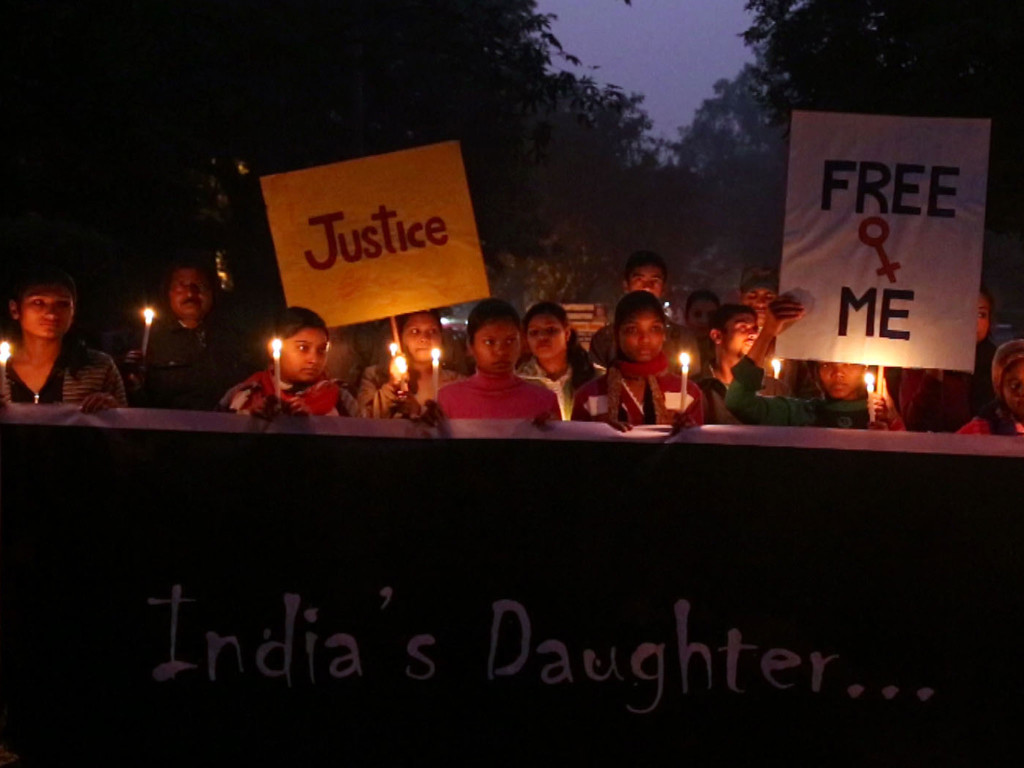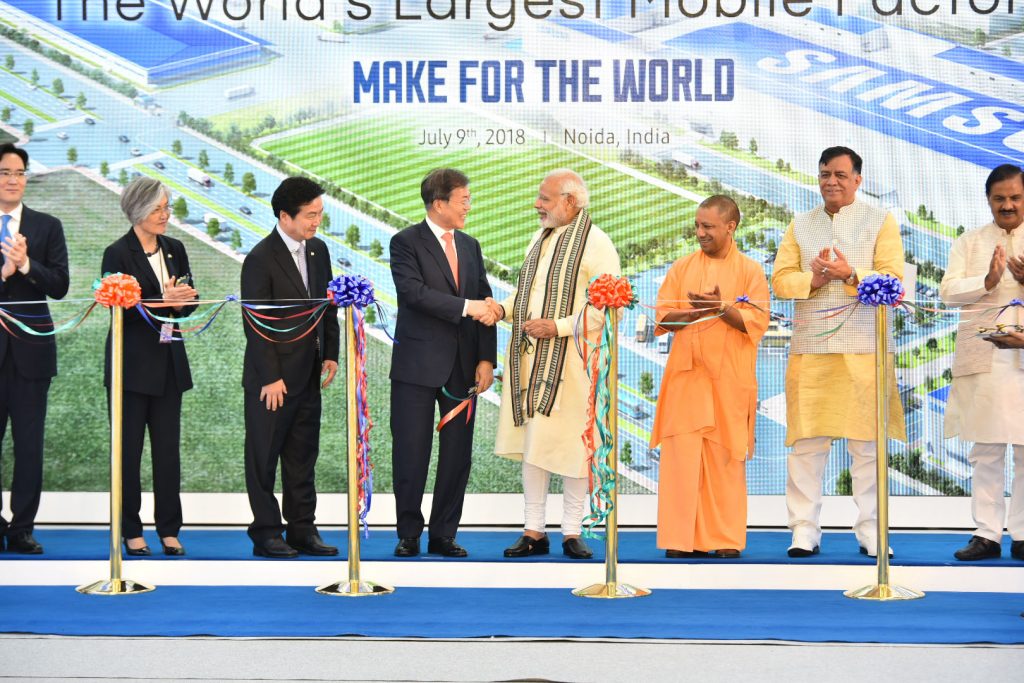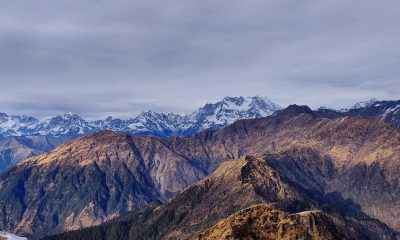India
India’s daughter documentary snow balls into controversy, banned in India.

Credits:
transitionofthoughts.com
It is a shame that at a time when India is projecting itself as a world super power and a country when women are seen heading top corporate is unable to tackle the issue of women safety and issues related with it.
The latest being the “India’s Daughter” a documentary film that has kicked up a storm based on the 2012 Delhi gang rape and murder of the 23 old physiotherapy women, the woman was named by media as “Nirbhaya” or fearless, and became a symbol for India’s fight to check crimes against women. The documentary features the opinion of one of the convicts of the gang rape in Delhi were interviewed in prison in Delhi where he awaits his death sentence.
India’s daughter is part of the BBC’s ongoing story Ville series directed by Film maker Leslee Udwin, the Documentary film was to be broadcasted on March 8 commemorating International Women’s Day in India on the popular New Delhi Television (NDTV) that was banned Nirbhaya documentary saying that it is not in the interest of the country and feared a public outcry.
Ruling Bharatiya Janata Party (BJP) obtained a court order on 4 March 2015, banning the broadcast justifying that it aims at protecting and ensuring that the sensibilities of women in the country is paramount.
The Filmmaker Leslee Udwin, who directed India’s Daughter, has rejected claims by the Indian Government that the documentary contained offensive remarks towards women, and could cause a public outcry as told by her in BBC interview.
Brushing aside Indian protests, the BBC has telecasted the documentary; India has no jurisdiction over BBC 4 which has already aired the documentary.
Mass Media, especially Cinema has historically played a huge and a pivotal role in shifting mindsets of the masses and classes in India and shaping our society. Women have been always projected as a weak gender and even in films if a woman is raped the only option left for her to kill herself, largely believed that she brings shame to the family and it is a social stigma to report the issue seeking justice.
Whenever films have touched on sensitive issues show casing hard realities of Indian society be it oppression of women, child marriage, dowry deaths, women trafficking so on…. have been center of controversy and on many occasions banned.
Indian cinema and films were recently showcased worldwide celebrating 100 years of cinema with pomp and gaiety not only in India but around the world. The popular love stories of India have carved a niche of itself worldwide and successfully able to entertain and enthrall audience worldwide not only in India but in US, UK, Russia, Canada, Poland, Middle East and African countries, but hard hitting movies run into controversy.
The world was shocked and horrified by the Delhi gang rape in 2012 when the victim was gang raped and brutally thrown out of a moving bus, the incident open the Pandora box and the loop holes in the system and the way we pursue women safety and security.
The outraged that followed across the nation after the incident forced the Delhi Police and judicial system to enforce stringent laws and punish the culprits.
The incident caught the attention worldwide was able to put tremendous pressure on the authorities on safety and security issues and demanded measure the curb the menace.
Various mediums and platforms openly began discussing the issue of women’s safety in India worldwide.
Dr, Vikrant Kishore a documentary film maker and Faculty of Communication and Media Production, University of New Castle, Australia, said that documentary that brings to fore the heart wrenching story of Rape crimes against women in India and how we how we as a society treat women.
He personally feels that the documentary is interesting way it has interwoven various point of views, especially of victims parents, the perpetrator of the crime, their family members, and the defence lawyers. He feel it is a timely documentary to initiate a discussion and debate about the heinous rape crimes, which we hear on a daily basis in India, since the release and online posting of the documentary India’s daughter. There has been huge online response through various social media and networking sites, most of them praising the film and few trying to rip it apart calling it a shoddy piece of work and some even labelling it sensationalistic and full of lies.
Dr. Kishore says he does not find it sensationalistic, as it is in the nature of the subject of the documentary that was ought to make people take notice, also probably the Indian media picked up the story of the documentary and brought the discussion on prime time television, which attracted major attention for the documentary. In this instance the Indian government thought it would tarnish the reputation of India. But then why was the Indian government silent on another BBC documentary on the same rape case that was produced in 2013, which was rather harshly titled – India: A Dangerous Place To Be A Woman?
But if the Indian governments objection to the documentary and the filmmaker is about the non compliance of the rules and regulations of the country to conduct the shoot… then the government has full right to take any action against the documentary.
Professor Karuna Kaushik, feels that it is a shame India being the largest democracy is trying to curtail freedom and power of social media. After the Film was uploaded on Youtube and went viral it was banned and youngsters began a discussion on social media. For a healthy democracy a open media and a platform to air ones views is vital, she adds.
Shiva Ranjini, a school teacher working in Bangalore also a mother of young daughter fears the safety of her child. Recalling the incident where a young six year old girl was raped in school, she feels that the government to wake up to the horrendous crime and tackle the issue seriously rather banning films.
Unfortunately, fearing a public uproar and outlawed by the Indian authorities on the grounds of “objectionable content” and rapists are being glorified in the documentary the issues snow balled into controversy, the Indian government directed Youtube India to block the Video in India.
Activists of leading Women’s organisation All India Mahila Samskruthika Sanghatane (AIMSS) leader Poornima staged protest against Nirbhaya case convict Mukesh Singh in Mysore on International Women’s day, they also opposed the permission to interview Singh as part of a documentary on Nirbhaya.
According to her interviewing and documenting the convict’s version is encouraging the convict to shift the blame on the victim? “This indicates the psyche of the male dominated society, which should be protested,” she said. The documentary was made with prior permission and full support of victim’s parents, who wanted to expose the atrocious crime and the loop holes in the system. Even after three years incidents like rapes have not come down. According to the National Crime Records Bureau statistics 93 women are raped in India every day and child sexual abuse occurs at horrifying levels and is massively under reported.
The government is now questioning the permission documents that the filmmaker obtained to get the jailhouse interview and reviewing procedures for access those in jail, which could set a dangerous precedent.
Bar Council of India did not waste any time and reacted quickly and issued a show-cause notice to defence lawyers of four convicts in the Delhi Gang Rape 2012 for their offensive remarks in the film.
Babita Menon, a young medical student by feels ashamed that she is living in a country that shy’s away from the reality that the horrendous crime is part of the society and takes place every day.
She strongly advocates that the documentary should be viewed by every citizen of the country to understand and get a clear perspective on the mind set of men who think raping women is their birth right. In a civilized society creating an awareness and further discussion is necessary to challenge many notions and change the culture, the documentary will not result in increase in the number of rapes. It can facilitate more and more women to come forward and report cases of rapes as more and more women break the cycle of shame.
The convict openly speaks his mind and expresses his views that is deep rooted in our society and reflects Indians culture. Babita strongly we need to change the attitudes of police, who perpetuate the “shame on the woman” myth by discouraging women to report rapes. We need to change laws to reflect the equal status of women in India and provide the resources they need to protect themselves.
Banning books, films or controversial speech has long been a government tactic to suppress free speech and limit scrutiny. This is not the first time a film is banned in India and public outcry is seen, many protests were organized against the film Slumdog Millionaire that won Oscar awards and internationally appreciated. The public protest and outcry was that India was showcased badly and on the grounds that it intentionally exploited the poor for the purposes of profit, also arguing that the title Slumdog Millionaire is offensive, demeaning, and insulting to their dignity.
India
Government Changing Syllabus to Include Sikh History in India

Chief Minister of Uttar Pradesh, most populous state in India, has announced inclusion of Sikh history in the state syllabus. Students of all schools under UP State Board will see the new chapters. The announcement came when Chief Minister Yogi Adityanath (BJP) was observing Sahibzada Diwas.
Why do we Observe Sahibzada Diwas?
Sahibzada Diwas marks the martyrdom of four ‘sahibzada’ (or sons) of Guru Gobind Singh (10th Sikh Guru) and his mother Mata Gujri. In the year 1705, Mughal Emperor Aurangzeb had ordered torturing of youngest sons of Guru Gobind Singh aged 5 and 8. He later executed the little sons by burying them alive into a wall. The reason for this act was that they refused to convert to Islam. Soon after this event Guru Gobind Singh’s mother, Mata Gujri also martyred her life under Aurangzeb’s captivity. The cause of her death is still unclear. Guru Gobind Singh’s other two sons martyred their life in the Battle of Chamkaur Sahib. Thus the 10th Sikh Guru, Guru Gobind Singh had lost his whole family by 27th December. This is an important event in the Sikh history in India and UP Government is finally keen on observing Sahibzada Diwas every year.
Why UP Government is Changing the Syllabus?
Soon after the independence of India in 1947, the school education came under tight grip of far left and communists. Most of the Indian history in the recent past has been written by Romila Thapar and Irfan Habib. They have close ties with left wing ideology and Irfan Habib has delcared himself as Marxist. They wrote history text books by either phasing out sections of Indian history or diluting certain events. The motivation to soft alter the history has been to propagate left-wing/communist ideology. Historian Koenraad Elst once highlighted that Romila Thapar is comfortable neither in Sanskrit nor in Farsi language. The knowledge of these two languages is a must to understand India’s history.
In the recent years, various public opinions have gained momentum to rewrite Indian text books to include more content on Indian rulers and native ideas. Currently, Indian text books mainly teaches about foreign rulers of India such as Mughals and British.
With this announcement of inclusion of Sikh history in history text books, the government is bringing historical facts in mainstream.
27th December as Real Children’s Day
Chief Minister Yogi Adityanath has also reached out to the Education Minister to declare Sahibzada Diwas as Children’s day. He further added that “The history of Sikh gurus will be a part of the syllabus. Apart from this, we should observe December 27 every year as Sahibzada Diwas in all schools. Today is the day to pay gratitude to the sons of the Guru and mother who martyred their lives for the motherland, country and religion.” Yogi Adityanath also said that “No society can move ahead if it forgets history. The Sikh society is known for its hard work. The Sikh gurus sacrificed their lives to defend the Hindu religion. The country will always remember this.”
Yogi Adityanath added that learning about the sacrifices by Sikh Gurus would inspire future generations to dedicate themselves into nation-building. He emphasized that we should make future generations realize that India and Indian culture was safe because of sacrifices of Sikhs.
What Should We Do On Sahibzada Diwas?
Sahibzada Diwas should be an important day for every Indian regardless of their region, culture or religion. On this day, we are in the Holiday mood as it falls right between Christmas and New Year’s eve. However, we should remember that a Guru and his entire family sacrificed their life for the well being of India and the idea of India.
On this day we can fast, do sewa (service), visit a nearby Gurudwara and sleep on the floor at night.
China
Nepal Hindu Rashtra: Time to Wrap Up Communism?

Nepal abolished the Constitutional Monarchy in May 2008 and declared itself as a Federal Democratic Republic. There was a new hope in Nepal as it was becoming world’s newest democracy even though it had dissolved the Hindu Rashtra. However, the democracy in Nepal immediately got into the tight grips of leftists and communists backed by China. It has been almost 12 years since monarchy was abolished in Nepal. Interestingly, the Himalayan country has already seen 11 Prime Ministers in this period. Thus, leaving the Nepalese people still yearning for good and stable governance.
Re-establish Hindu Rashtra
As the political instability is growing in Nepal, people are demonstrating concerns about the future of the country. In fact, Nepalese citizens are unhappy with frequent interference by China and India influencing its unstable communist regime. More voices are now growing in support of reinstating the Monarchy and declaring Nepal as world’s only Hindu Rashtra (which by default offers full religious freedom to other religious minorities as per Hindutva concept of Sarva Dharma Sama Bhava – all paths lead to one).
Former Deputy Prime Minister of Nepal, Kamal Thapa said that if political parties do not recognize the seriousness of reinstating the monarchy, then the country will head for a period of darkness. “Recently, we’ve had high-ranking officials from India and China come to Nepal to try and solve problems within the ruling party,” he said. “We cannot let others dictate what we want to do.”
Communist Party All Set to Suppress Protests, By Force
Kamal Thapa has firmly demanded an all party meet to discuss reinstating of monarchy. Throughout the month of December, 2020 Nepal has seen anti communism protests across the country in support of reinstating the monarchy and Hindu Rashtra. Most importantly, the demand has become a nationwide mass people’s movement. So much so that the communist regime had to send a directive to 77 districts in 7 provinces. The directive suggests suppressing the protests by force. Nevertheless, Rashtriya Prajatantra Party and other royalist groups have ignored this threat from the communist regime. Protester groups have pledged to strengthen the protest in the coming weeks.
Nepal: Demonstration held in capital Kathmandu, demanding restoration of monarchy in the country. pic.twitter.com/TFjmKu9U9Z
— ANI (@ANI) December 5, 2020
Role of China – Hope for Communism in Nepal
China’s ambassador to Nepal is known to have very close relationship with Nepalese Communist regime. In fact, She has been super effective in tilting Nepal’s posture towards its ideological partner, China. One of her greatest achievements in 2020 was artificially manufacturing a border conflict between Nepal and India. Consequently, souring relations between the two Hindu majority nations. In addition, she managed to silence Nepal’s communist government after China took one of Nepal’s border villages under its control. However, recent political turmoil in Nepal and a renewed demand for reinstating of Hindu Monarchy is showing that the situation is now out of Chinese hands
Role of India
Year 2020, was not a good year for India and Nepal relations. India was busy in controlling domestic Covid cases. On the other hand, China had launched an invasive campaign into Indian territory. In addition, India is always busy with Pakistan on its western borders. However, the surprise came to India when China was almost successful in creating a new border tension between India and Nepal.
Those who do not know about Indian government should note that the current ruling party in India finds itself ideologically opposite to communism. This further creates differences between the two countries.
Communist party in Nepal has blamed India for supporting the ongoing anti communism protests in Nepal. However, former advisor to Nepal’s PM has suggested there is no proof that India is fueling pro Monarchy, anti communism demand in Nepal.
Nevertheless, There are certain influencers in India who have, in their personal capacity, expressed support for reinstating the Hindu monarchy. Yogi Adityanath, who is the Chief Minister of an Indian state bordering Nepal, said in 2015 that Nepal should declare itself a Hindu Monarchy. Readers should note that in 2015 Yogi Adityanath was not the Chief Minister yet. However, today he is not only popular in south of Nepal, his popularity is growing in Nepal as well.
Will The World See the first Hindu Rashtra?
It is difficult to answer this question at this moment. However, Nepalese communist government could not resolve the political instability and in December 2020 Nepalese government dissolved the parliament. Nepal will see next elections in April – May 2021. Hopefully, the world will see Nepal’s 12th Prime Minister in 13 years or may be a Hindu King? Royalists and protester groups have expressed confidence in winning next elections. We have our eyes on Nepal for updates.
India
Humanity Endures During Coronavirus Pandemic

Photo by Press Information Bureau, Government of India
The world changed exponentially since the pandemic broke out. We changed too. Emotions are running high. We have learnt to take one day at a time and have stopped expecting changes to happen overnight.
“COVID19 is menacing the whole of humanity – and so the whole of humanity must fight back”
A clarion call from United Nations Secretary-General António Guterres is a call to unity and solidarity. Already plagued by natural/manmade disasters and wars, many countries seem to bite the dust for want of resources in the fight against the virus. Warning each other against complacency is appreciable but never a blame game to cover up a dysfunctional response. Not all update themselves on the governments, new economic policies and R&D on Covid vaccine. Many we come across seem to be making wise individual choices. No matter how badly the tiers of government fail us, there will always be thousands of people working to make things better. Besides, finding reasons and faults on policies for the spread doesn’t help. A virulent strain of flu had managed to spread within a few months to the remotest corners of the world infecting half a billion people – more than a quarter of the human species in 1918 long before the current age of globalization.
Separating, alienating and forswearing the endless moments of contact that knit society together thrust us into frightening new realities. The good is still there. Social distancing is nothing but taking a step back to literally give breathing space to others. Going by news & views, we understand that amid concerns of rising numbers of positive cases in frustrating circumstances, acts of kindness and solidarity are burgeoning. Yes, it’s been extremely sad and sobering to watch this all unfold, but watching people share resources and supporting one another in every conceivable way has made us feel more connected to our local communities. Whether singing a song together out on balconies, getting groceries for the elderly or calling a friend to alleviate anxiety and fear, each one I know play a part and take comfort in a sense of togetherness. We are steadily aware of our limitations yet don’t hesitate to free our wells of compassion. Do we think twice and thrice to make an online contribution to save the lives of people we don’t know and will never know!
Sadly, it has taken an invisible virus to help us belive once again that we are strongest only when we have the welfare of others in our mind. Halfway through quarantine and self-isolation a phone call, a kind word, an opportunity to reach out, a breeze, bird calls, one good news and loss of a loved one, we are hit with the necessary humility and awe we ought to feel and appreciate just how beautiful our world is and precious life is.
Post pandemic recovery will be better and bigger if life goes on with this beautiful idea, of humility, inwardness – as an ethical relationship, for the sake of others. For better or for worse, we have learnt that one can’t be an island unto himself. Lives are intertwined and are bound together. We, humans produce more rubbish than any other species. The growth in the human population is part of the explanation, but cannot account for all of the extra rubbish, a result of haste and greed both which almost skinned humans of humanity.
Unity among countries must ensure that all countries are equipped to trace, isolate and treat people infected by COVID-19. Only a global effort can avoid the collapse of any country’s medical system. Sanctions that affect health care should never be imposed. Development in one part of the world should not rob another country of it’s resources. Humanity gains the upper hand over invisible predators through the sharing of reliable scientific information, global solidarity, vaccinations, antibiotics, improved hygiene and a much better medical infrastructure. Today,it doesn’t take too much to figure out that global sharing and caring is the best defense. The Jing Si aphorism, “Good actions require everyone’s cooperation. So let’s not cling to personal biases” holds good for all times.
Stories of good samaritans are aplenty. To know humanity is still alive and kicking and is at it’s best when united assures us that we’ll come out of this “abnormal” time with a new normal. In their own unique ways, humans respond to protect life and health and ensure respect for fellow beings. ‘single-nucleotide polymorphisms’ are no joke. From handing over meals, survial kits, medicines, home made masks to calling on an old couple across the street, everything is humanity in action and it is the power of this humanity – humane behaviour towards other humans – that we seek to celebrate, improve and increase, especially during crucial times. Remember “A person with a generous heart and compassion for all beings leads the most blessed life”.
With thousands of migrant workers taking it on their chin, vehicles filled with food and ration along highways reach the needy and stranded and canteens serve free food. Rays of sunshine! We see through hypocrisy and deceptions, hear excuses for inefficiency, inadequacy and inflexibility and within the tumult and uncertainty we are doing much, much better in life than we thought we can. Quietly. Kindly. Gently. Being able to spare a part of us to help someone live is worth being thankful for. ” Giving with an expectation for return brings misery”. May we give generously, but don’t guilt ourselves if we can’t. If we have nothing left to spare, let’s go slow and kind.
The world is being taught a lesson, the harder way. This lesson is not about rich and powerful versus poor and powerless but about leadership that treasure the common wealth and common good, above private greed and profit and above protecting the privileges of a handful elites.
None of us are actually going anywhere. Might as well stay. The conclusion we draw from this crisis is that all humans matter equally, that we need to give a hand, raise one another, flourish or perish together- no matter what our limitations are, we’re capable of a great deal. This virus backlash is nothing short of a fleeting lesson to all leaders about how sane, humane societies should function all the time. Those who regard themselves as wonderfully favored of leadership, power and pelf are called to do great things. Anything that constantly arise to cause conflicts or disunion must be questioned, criticized, denounced and judged.
Be it a forced contemplation of our mortality or a sudden urge of self denial or an awareness of the passage of time and life, this screeching halt is proof that humans are designed to be more productive when connected, even in isolation. So, not all hope is lost. The time has come when we must know for ourselves why we believe in humanity as we do.
“Do something good for somebody today; the people who are trying to make the world worst aren’t taking days off.”
Gestures to honor humanity are varied, aplenty. A flypast in India is a cruel joke on the already tumbling down economy and on the selfless humanitarians who spare nothing to reach out. We can only wish the trail of showered petals, if showered will guide the departing victims of COVID19. Flying past/over ground realities is a highly irresponsible act of governments. Also, a misuse and mismanagement of meagre resources.
Was it a premonition that urged saint Thiruvalluvar, celebrated Tamil poet and philosopher to get on with kural 578 which when translated into English goes as
” The world is theirs (Kings) who are able to show kindness, without injury to their affairs, (administration of Justice).




















